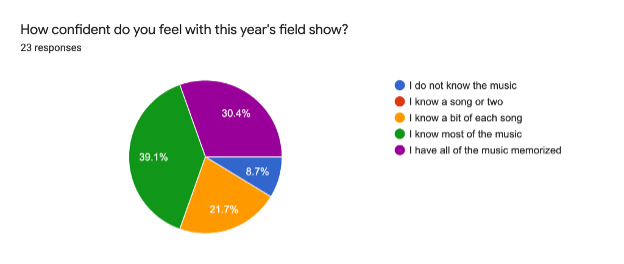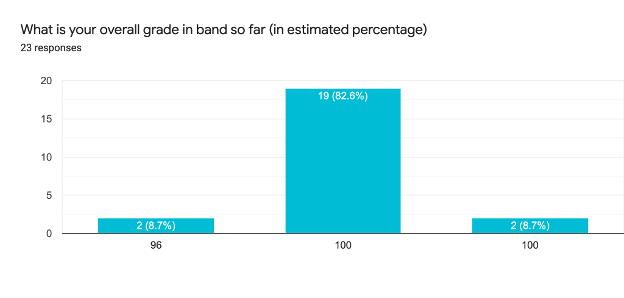Chapter 3: Literacies across the disciplines
3.6.1 The effects of musical illiteracy (argument from experience)
Alana Thigpen
English 102, September 2020
Music can be defined as many different things, ranging from vocalization to the physical notes on a piece of paper. With such a broad range of elements that can be considered music, it is hard to pinpoint who has a full understanding of music and is therefore musically literate. While being experienced in any one category would deem you musically literate, basic reading and comprehension of music is the first step in mastering all musical literacy. To be literate is to understand the instrument you are playing, as well as the song being performed. My high school’s marching band has been performing at school functions and across Ohio since 1949. During my time in the band, this being my fourth year, we have never won any prestige award as an ensemble. This, I believe, is due to the lack of musical literacy, which has deeply damaged the progress of the group.
When I decided to join the marching band my freshman year, I was dead set on playing the saxophone. Something about the sound of the reeded instrument was mesmerizing to me. I was already a part of an orchestra ensemble when I joined, giving me the advantage of already being able to read music. This ability, as well as my dedication to the instrument I loved, led me to become the first chair in our band. It was not until I was awarded this position that I understood why I had received it. When in sectional practices with even just my group of fellow saxophonists I found that many could not read the notes on the page or could not connect them to the fingering on their instruments. Out of the eight current saxophone students in my section, only four can play all the show music. While all the section has been in the band for at least a year, the other four have instruments that do not work properly, or they do not know how to play at the level the music requires. Throughout the band a reoccurring issue is that students have joined and received school-owned that were out of tune, bent, or even completely broken, but because they had never played before they had no clue that they were doing something wrong.

When sending out a survey for the band members to complete, only thirty percent of the students said they were very confident in this year’s field show and had all the music memorized. The rest of the participates had answers that ranged from knowing most of the songs, to not knowing it at all. With such a small percentage of students knowing the music, you would think that the grade book would reflect this, but it does not. Everyone who participated in this survey reported their grades to be somewhere from ninety-six percent to one hundred percent, regardless of their musical literacy. This is because in most cases, coaches of extracurriculars are enthusiastic about getting new members and want to touch as many people through their organizations. So, while my band directors’ intentions were purely to let as many children interested in music join the marching band, by letting everyone be a part of the group, she significantly diminished the quality of the music and performances that followed. But because she wanted to continue to have a big band and encourage children to join, she made it an easy A class. Many other players like me have seen the lack of effort from the new members and have therefore been discouraged as well. The mentality across the field then becomes, if I try and we still suck, then what is the point in trying?

At a recent practice, my saxophone was noticeably out of tune, so I stopped and tuned it with my phone. The assistant band director found this amusing, saying, “You are so cute! What is the point in tuning yourself to play with an out of tune band?” to which I replied, “To make sure that my personal performance is the best it can be”. But if even the assistant band director can recognize that the entire band is generally out of tune, but does nothing to fix it, what does that say about our leadership?
Reasonable discipline would easily fix this issue but at the cost of losing half the band members. I spoke to one of my fellow saxophonists who is only a freshman but joined last year. When I realized she could not play the music and was also using a cheap saxophone which did not help the sound, I asked her why she did not bother to practice. Her response to me was along the lines of, she does not feel the need to, because no one will notice her whether she plays the right way or not. What she failed to see is that one person playing every note wrong weakens the sound of the band as a whole. But if no one is willing to take the time to teach new students how to play their instruments, there will be no one to take over first chair positions or leading roles when the dedicated students leave out of frustration.
As my time as a leader of the Panther Marching Band comes to a close, I have watched band turn into more of an after school hang out and a free ticket to the football games rather than a serious group that is passionate about music. This attitude reflects poorly on the entire band, and our hard work to make every season great does not get a chance to shine through because of it. For this reason, I think more strict regulations should be put in place for the enjoyment of band, as well as for the betterment of its future generations. I believe the first step to achieving an award-winning band is teaching students about their instruments. Students should be welcomed into the band and handed a previously inspected instrument to practice with from day one. Making sure the instrument is in good condition is essential to the sound of the band. Then, with proper coaching and sectional time, they will be able to transition seamlessly into learning the notes on their sheet music, and in time become musically literate in their section of the band. If the entire ensemble could familiarize their newest members with their corresponding instruments, everyone would be motivated to play because they would know how. This approach would require some standard disciplinary action to set the example, but overall would contribute to the group’s progression and inevitable success. Those students who currently do not care about the quality of their performances and therefore show up late or goof off during practice should be disciplined with laps around the field, pushups or grades that reflect poor behavior. These forms of discipline are standard for members of our dance team and drumline and it is actively reflected in their performances. Both groups have competed in events separate from the band, where they have won most of the first-place trophies that decorate the shelves of the band room. In all four years that I have been a part of the marching band, we have come in the last place in Ohio’s Battle of the Bands competition, and even left early on our own field last year following a humiliating loss. While this is my last year, I feel as though implementing these practices to encourage musical literacy will be an accomplishment that will be bigger than any one person can claim credit for. Musical literacy has made me the passionate player that I am today, and I can only hope to share that with future students.

